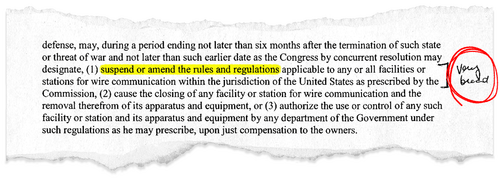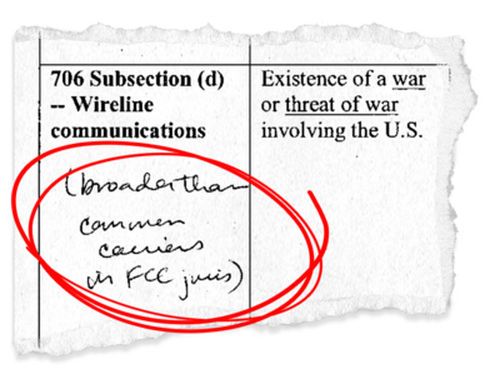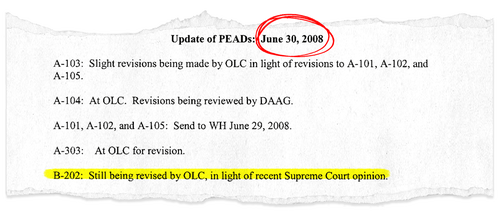(Activist Post) Previously classified files obtained by the Brennan Center for Justice reveal that the 2004 George W. Bush administration conducted a holistic review of the president’s emergency powers, with the goal of modernizing a set of secret plans for continuity-of-government in a nuclear war.
Related ‘Top Gun: Maverick’ Continues to Dominate at the Box Office
by Staff Writer, May 30th, 2022
The George W. Bush Presidential Library turned over 500 out of 6,000 pages of the documents, known as “presidential emergency action documents” (PEADs), which “shed troubling new light on the powers that modern presidents claim they possess in moments of crisis,” according to the Brennan Center, which obtained the records through a Freedom of Information Act (FOIA) request.
PEADs were created during the Cold War, when the chance of a Soviet nuclear strike was at its peak. Early drafts reportedly rested on broad interpretations of executive powers. According to official reports from the 1960s, various PEADs authorized the president to enact measures such as suspending habeas corpus, to detain “dangerous persons” within the country, to censor news media, and to prevent international travel.
In light if 9/11, one Bush administration official viewed updating the PEADs an “urgent and compelling security effort, especially in light of ongoing threats.”
While the Brennan Center was unable to obtain more recent PEADs, the documents show “some of the most disturbing aspects of early-Cold War emergency action documents” were maintained at least throughout 2008.
Here are the specific findings via the Brennan Center:
Controlling communications
At least one of the documents under review was designed to implement the emergency authorities contained in Section 706 of the Communications Act. During World War II, Congress granted the president authority to shut down or seize control of “any facility or station for wire communication” upon proclamation “that there exists a state or threat of war involving the United States.”
This frighteningly expansive language was, at the time, hemmed in by Americans’ limited use of telephone calls and telegrams. Today, however, a president willing to test the limits of his or her authority might interpret “wire communications” to encompass the internet — and therefore claim a “kill switch” over vast swaths of electronic communication.
And indeed, Bush administration officials repeatedly highlighted the statute’s flexibility: it was “very broad,” as one official in the National Security Council scribbled, and it extended “broader than common carriers in FCC [Federal Communications Commission] juris[diction].”
Previously, it was a matter of speculation as to whether any emergency action documents purported to implement this authority. But Bush officials evidently examined at least one such document as part of their review, a Communications Act PEAD that appears to have predated the administration. And the library’s records suggest that the administration added three more documents on the same subject.
Detention authority
The records indicate that at least one presidential emergency action document pertained to the suspension of habeas corpus. An internal memorandum from June 2008 specified that a document under the Justice Department’s jurisdiction was “[s]till being revised by OLC [Office of Legal Counsel], in light of recent Supreme Court opinion.” Examining the Court’s rulings over the previous months, it is evident that this must refer to the landmark decision in Boumediene v. Bush, which recognized Guantanamo Bay prisoners’ constitutional right to challenge their detention in court. This strongly suggests that the early–Cold War PEADs purporting to suspend habeas corpus had survived, at least in some form, and were part of the Bush administration’s review.
The result of the administration’s post-Boumediene revision is unknown. Significantly, though, it doesn’t appear that any emergency action documents were withdrawn or cancelled. To the contrary, eight PEADs were added, bringing the total number to 56.
Inhibiting the right to travel
Restricting the use of U.S. passports — a reported feature of some early presidential emergency action documents — remained on the table as of 2008. Records generated by the Bush administration’s review highlighted a provision of law from 1978 that allows the government to curtail international movement based on “war,” “armed hostilities,” or “imminent danger to the public health or the physical safety of United States travellers.”
Although presidents have used this statute to ban travel to Lebanon, Iraq, Libya, and North Korea, a more sweeping abrogation of the right to travel would represent a stark break from modern historical practice.
Triggering other emergency powers
The national emergency declared after 9/11 — which is still in effect today and continues to prop up the United States’ military presence across the globe — was cited in connection with one or more PEADs.
A national emergency declaration unlocks enhanced authorities contained in more than 120 provisions of law. Bush invoked several such authorities, but several dozen others were — and still are — available to the president as a result of Proclamation 7463. Presumably, the reference to the proclamation during the administration’s review implies the existence of documents designed to implement other statutory emergency powers, which run the gamut from anodyne to alarming, nearly four years after the attacks.
As with any archival expedition, the silences are often the most telling. William Arkin, a noted expert on PEADs, reviewed the new materials disclosed by the library and observed that they relate primarily to civil agencies — few, if any, touch on the role of the military in times of crisis. He suggests that this “black side” would have been discussed at a higher level of classification. By implication, the most daring claims to presidential power may have been entirely excluded from this tranche of documents.
Also missing from the records is any evidence that the Bush administration communicated — much less collaborated — with Congress during its review. We have previously noted that presidents have kept PEADs secret, not only from the American public but from lawmakers as well. This lack of disclosure effectively blocks a coequal branch of government from overseeing emergency protocols.
With Congress unable to serve its constitutional role as a check on the executive branch, there remains the possibility that modern PEADs, like their historical predecessors, sacrifice Americans’ constitutional rights and the rule of law in the name of emergency planning. Congress should pass Sen. Ed Markey’s REIGN Act, which has been incorporated into the Protecting Our Democracy Act and the National Security Reforms and Accountability Act, to bring these shadowy powers to account.
Organic Lion’s Mane Mushroom, proven to grow new brain cells and synapses. Guard against Alzheimer’s, dementia, and mental decline. Save 10% and get free shipping with a subscription!“I can feel my mind getting sharper with Lion’s Mane. I put it in my coffee.”
Get your Lion’s Mane from Ascent Nutrition, one of the most pure and potent in the industry.
Stillness in the Storm Editor: Why did we post this?
The news is important to all people because it is where we come to know new things about the world, which leads to the development of more life goals that lead to life wisdom. The news also serves as a social connection tool, as we tend to relate to those who know about and believe the things we do. With the power of an open truth-seeking mind in hand, the individual can grow wise and the collective can prosper.
– Justin
Not sure how to make sense of this? Want to learn how to discern like a pro? Read this essential guide to discernment, analysis of claims, and understanding the truth in a world of deception: 4 Key Steps of Discernment – Advanced Truth-Seeking Tools.
Stillness in the Storm Editor’s note: Did you find a spelling error or grammatical mistake? Send an email to [email protected], with the error and suggested correction, along with the headline and url. Do you think this article needs an update? Or do you just have some feedback? Send us an email at [email protected]. Thank you for reading.
Source:
Support our work! (Avoid Big Tech PayPal and Patreon)DIRECT DONATION








Leave a Reply